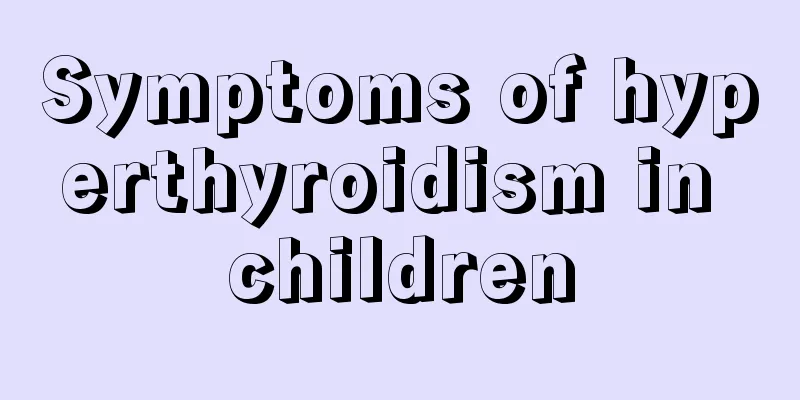Do newborns have peeling skin?

|
It is a normal physiological phenomenon for newborns to have peeling skin. Because the metabolism of newborns is very fast, peeling skin is also a normal physiological reaction. Of course, the peeling phenomenon of different babies will be different. Some babies have very obvious peeling phenomenon. At this time, parents should observe whether the baby's sleep and diet are normal. If there is no problem, don't worry too much. Do newborns have peeling skin? Newborn skin peeling is a phenomenon that every newborn will experience and is caused by the metabolism in the newborn's body. The skin of a newborn baby, like other organs and tissues, has not yet fully developed in structure and does not have many of the functions of adult skin. It will take at least three years for it to develop like that of an adult. Different babies will have different degrees of peeling. Some babies may only have slight dandruff, while others may have more obvious peeling, like a snake shedding its skin in large flakes. However, as long as the baby's diet and sleep are normal, it is normal and mothers should not worry too much. After the dandruff falls off, the skin will return to normal and there is no need to take special protective measures or forcibly tear off the peeling skin. However, if parents find that their baby has peeling accompanied by other symptoms such as redness, swelling or blisters, it may be a symptom of a disease, and they need to go to the hospital for treatment. In fact, most of these changes in babies are temporary physiological changes. Mothers do not need to panic, but should respond and care appropriately. Because there will be friction at the hem of the newborn's skin, coupled with excessive sweat and secretions, the local heat cannot be dissipated, which will cause congestion and lead to redness, erosion, and epidermal peeling of the skin. Therefore, bathing the baby is something that parents must do every day. It is very important to keep the baby's skin clean. What to do if your newborn's skin peels Almost all newborns will experience peeling, whether it is mild dandruff or snake-like peeling. It is normal as long as the baby's diet and sleep are fine. What to do if your newborn baby's skin peels? Most newborns have skin peeling problems to varying degrees. This is related to leaving the amniotic fluid-filled environment in the mother's body. The external environment is drier than that inside the mother's body, and peeling is also a process of adaptation for newborns to the environment. However, some peeling phenomena are caused by certain diseases, such as ichthyosis, seborrheic dermatitis, eczema, neonatal lupus erythematosus, etc. Therefore, parents should pay attention to observation after the newborn's skin peels, and pay attention to the baby's skin care. Do not over-clean the skin, and apply moisturizing skin care products to the baby immediately after cleaning. When choosing skin care products, it is recommended to avoid those with strong fragrances and bright colors, because the main culprits of allergies caused by skin care products are the pigments and flavors added to them. If the parents have allergies, they should be more cautious when choosing cosmetics for their baby. They can first try it on a small area of the baby's skin for a few days, and then use it on a large area after no allergic symptoms occur. Alternatively, they can choose cosmeceuticals or moisturizing skin care products specifically for sensitive skin. |
<<: Elevated neutrophil count in newborns
>>: White spots on newborn's legs
Recommend
Yellow runny nose after cold in children
The probability of colds occurring in our lives i...
How to remove the plaster on children?
As we all know, plaster is a kind of physical the...
How tall is a seven month old baby?
Babies are the greatest source of happiness for a...
Premature babies born at 29 weeks need more care
The care of premature babies must be particularly...
Why is the newborn's face a little yellow?
Speaking of neonatal jaundice, everyone should be...
The child does not speak clearly
The development process of each child is differen...
What is the normal value of myocardial enzyme in infants?
When a baby is just born, his body is not fully d...
Neonatal retinal hemorrhage
We all know that when many newborns are just born...
Methods to relieve persistent high fever in children
There are many common diseases in children. When ...
What should I do if my child doesn’t grow hair?
Children are our future, so their growth affects ...
What to do with neonatal jaundice
What to do with neonatal jaundice is a question t...
Dietary treatment for alopecia areata in children
Parents are very worried about the healthy growth...
What are the simplest ways to relieve ear pain in children?
It is very normal for children to have some disea...
How many days does a child's fever usually last?
The baby's health is the top priority for eve...
How many months is it best to wean a baby?
Weaning is a very critical period for babies and ...









